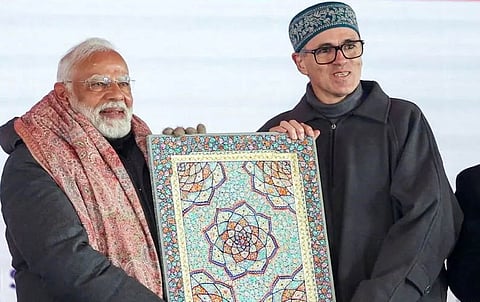During his recent visit to Jammu & Kashmir, Prime Minister Narendra Modi refrained from giving a time frame for restoring statehood to what is now a Union Territory, even as he said that the ‘distance between Delhi and the Valley has been erased’. “Everything has a time, the right things will happen at the right time”.
The Modi government is being closely watched in J&K, as also outside it, on how it fulfils its commitments – economic as well as political. After the abrogation of Article 370, the Centre gave the impression of doubling down on the erstwhile state’s economic development, while seeking to insulate it from the pull and tug of democratic politics. The assembly election of September-October was a welcome opportunity to restore the democratic process. The National Conference, a member of the INDIA Opposition bloc, was voted to power.
The Modi government claims to have recognised the importance of tourism in generating employment, supporting small businesses and improving J&K’s finances. Side by side, it has shown some understanding that the region needs to address critical issues related to infrastructure. Road development projects worth more than R40,000 crore, including four national highway projects, have been initiated. This infrastructure push has continued even after the National Conference under Omar Abdullah assumed office. Recently, as Modi inaugurated the Sonmarg tunnel in Kashmir, he pointed to a meeting ground between J&K and the Centre: “It’s time for all of us to realise our dreams and make resolutions and accomplishments together…”
If his overtures to the Centre after the October verdict are any indication, Omar too seems to have been nudged by the responsibility cast on him by the mandate to work closely with the Modi-led Centre. The pleasantries between Omar and Modi at the public rally to mark the launch of the tunnel apart, there are signs of calming in a landscape ravaged by decades of militancy.
Non-confrontational tone
“The people are asking me when will Jammu & Kashmir get the status of a state… My heart says that the prime minister will soon fulfil his promise to the people of J&K as well and that J&K will be a state again,” Omar said. The non-confrontational tone is consistent with the approach Abdullah has adopted since October, even as he has come under pressure from within his party and outside over his government’s limited powers. He has maintained that restoration of statehood remains his government’s priority, but at the same time, that he does not doubt the Centre’s intentions.
On 3 January, for instance, while pointing out that Modi ‘had himself committed to the restoration of statehood to J&K’, Omar said he wanted to give the Centre an ‘opportunity’ to do so first, rather than ‘going to courts’. Abdullah, of course, is also being pragmatic. As he put it earlier this month: “J&K runs a deficit budget; therefore, we are more dependent on the government of India than other states and UTs.”
It is not that Omar has not had any run-ins with Lieutenant Governor Manoj Sinha, the Centre’s top representative in the state. Since he took charge on 16 October, there have been two issues, where the elected government and LG have not been on the same page. A political row erupted when the National Conference and the CPI(M) criticised Sinha’s decision not to include 13 July (Martyrs’ Day) and 5 December (birth anniversary of NC founder Sheikh Abdullah) as official holidays. “We would have liked to have (the two) holidays, because it is part of an emotional attachment we have and also a part of J&K’s history,” he said.
The LG’s recent decision to grant extension to the vice-chancellors of the Sher-e-Kashmir University of Agricultural Sciences & Technology (SKUAST) and University of Jammu allegedly without consulting the CM has also raised people’s hackles, while the continuity of the J&K advocate general too is a matter of friction between the two.
While there have been ‘differences of opinion on some issues’, there was no confrontation with the Raj Bhawan, says Omar. “Systems work better when there is a single centre of command. For the UT, the dual centres of command are inbuilt. There have been differences of opinion on some issues, but not on the scale on which is being speculated. Such reports are just figments of imagination,” he added.

